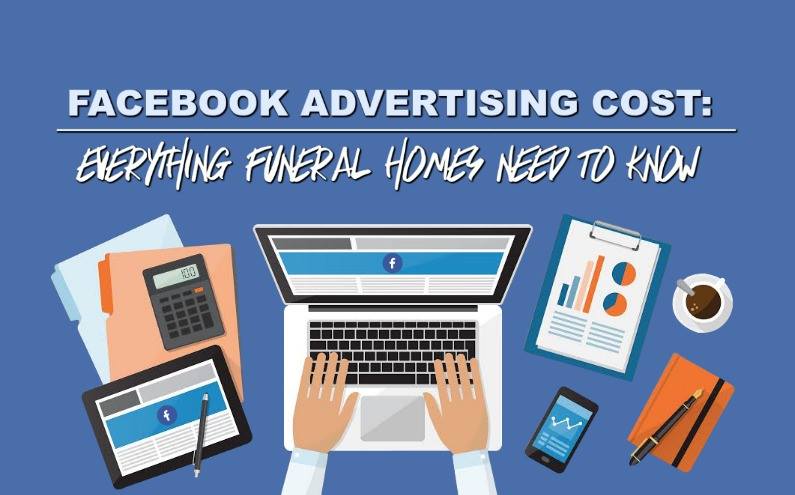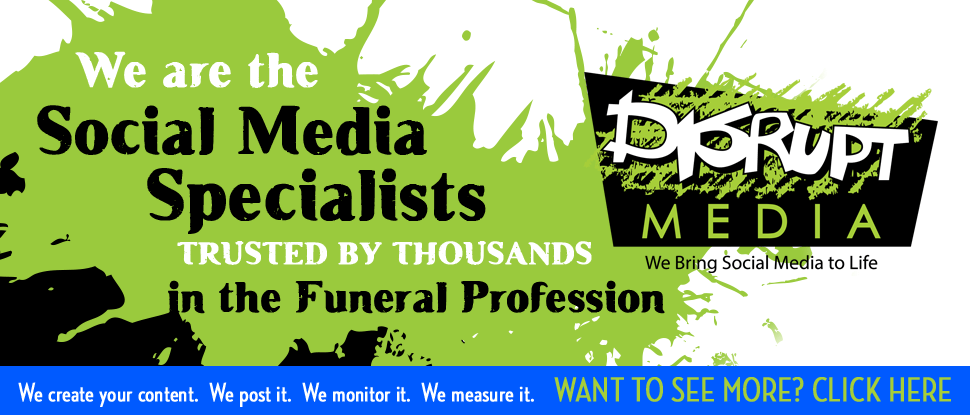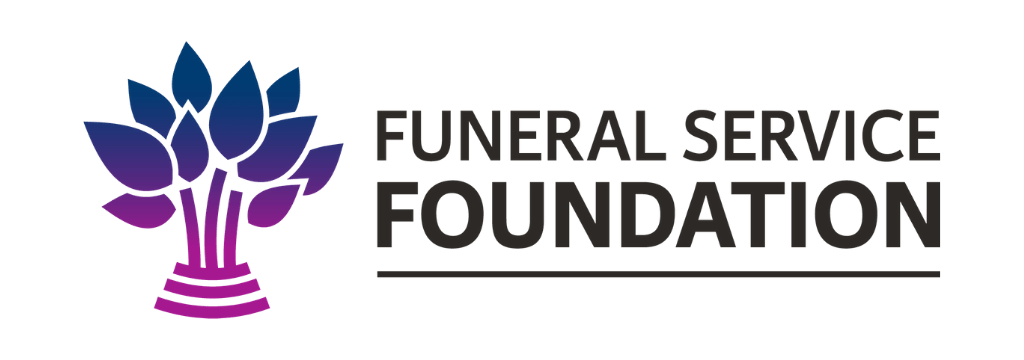Facebook Advertising Cost: Everything Funeral Homes Need to Know
How much does Facebook advertising cost? This is a common question for funeral homes who are just getting started with it. And unfortunately, there really is no cookie cutter, one-size-fits-all answer. But what we do know is Facebook advertising is massively under priced.
Fortunately, there are two things that can be said definitively about Facebook advertising cost:
- The results speak for themselves, with an ROI you won’t come close to with traditional media.
- Facebook Ads will never cost you more than you can afford, Facebook gives you full control on on what you spend with simple to use budget setting features.
When trying to project out your Facebook advertising cost, there are several factors you’ll need to take into account. But first, it’s imperative to understand how the Facebook ad system works.
Facebook Ads Machine – How It Works
Much like Google Adwords, Facebook uses a very in-depth algorithm to determine how to show your ads and even which ads actually get shown. The main difference between these two digital paid ads platforms is that Facebook Ads costs much less when compared to similar Google Adwords campaigns. They can also be targeted much more specifically to a desired audience – like a mother of 3 who has an income of $150,000/yr and a Veteran father. Facebook ads can be targeted so so granular.
With Facebook ads, you have a totally unique opportunity. There are several things about them never before seen together:
- They can reach as many people or more people as radio or TV, and in whatever country.
- They have sophisticated targeting like AdWords, albeit on different criteria.
- The minimum spend is just $1 per day.
- They are the lowest cost per 1,000 impressions ad in history. They average around $0.25 per 1,000, which is only 1% of the cost of TV. Are you kidding me? Nope, it’s for real.

Look, no one really likes seeing ads, right? So for Facebook to make the user experience valuable ads must be valuable to them as well. The main purposes of Facebook’s advertising platform are to:
- Help advertisers reach and get results from their target audiences.
- Create positive and relevant experiences for Facebook users.
Once an order has been placed, Facebook holds an “auction” for ads vying for space and attention. Money is not a large factor in deciding who ends up taking a coveted ad spot. This is both to be fair to those with small budgets, and to provide only the most relevant content to Facebook’s users. Facebook levels the playing field for all businesses. The auction also helps to serve the purpose of managing relatively little space against many bidders.
Factors That Influence Facebook Advertising Cost
Facebook analyzes submitted ads according to three major factors, which are evaluated and scored:
Advertiser Bid
The advertiser bid is how much you’re willing to spend for ads. Facebook uses this to determine how interested you are in showing your ad. Bids can be set manually or automatically, depending on your understanding of the Facebook advertising platform (for newbies automatic is the way to go and this is the default set by Facebook).
If you choose to bid automatically, Facebook decides the bid amount with the goal of using up your designated budget to get the best results. With manual bidding, you determine what you’re willing to pay per ad placement.
To achieve the best results, consider the following:
- Don’t bid too low. Otherwise your ad may not get the exposure it deserves. Ultimately, you get what you pay for. If you are willing to pay $5 bucks for a conversion don’t bid $0.75.
- When you bid high, Facebook won’t necessarily use that total amount. It will still get the lowest amount possible for the auction, relative to the next highest bid. This is similar to how Google Adwords works. This works very well. We have had situations where the monthly budget has been set at $1,000 yet the actual spend didn’t even top $500.
Ad Quality & Relevance
Ad quality and relevance refers to the perceived level of interest people have when they see your ad. Creative is the variable. Your creative has to provide value and make the user stop. I know it sounds crazy in a funeral environment to talk about creative – but it matters. Facebook ranks ads based on their relevancy scores, which can be viewed through the Facebook Ads Manager. The more relevant your add is the the better the add will preform. Interactions such as clicks and video playbacks can contribute to a higher score (scores range from 1-10 with 10 being the highest).

Estimated Action Rate
The estimated action rate refers to how likely users will address your specific call-to-action, which might include one of the following:
- Clicks to a lead page
- Visiting your sympathy store
- Liking your Facebook page
Facebook bases the estimated action rate on your target audience, who have previously completed actions (likes, clicks, views) related to your ad or to similar companies, as well as your ad’s previous performance. So, if the estimated action rate is low, Facebook will compensate by increasing ad cost accordingly.
Ultimately, the highest total score on these combined factors gets the most favorable placement and pricing. Again, creative and your audience targeting are going to greatly impart your score.
Other Factors That Influence Facebook Advertising Cost
The Audience You’re Targeting
The audience you choose will directly affect how much you’re paying for Facebook Ads. This, in part, will largely be affected by who else is targeting the audience you’re targeting. Knowing who your ideal customer is, is a major key to targeting the correct audience. Getting a granular as possible is key. For example, if you are advertising a cremation item from your sympathy store then you would want to target a user who has liked other pages related to cremation, shops online and has experienced a recent death. Targeting everyone within 10 miles of your funeral home between the ages of 18-65+ would not be a good idea.Quality of Your Ad
The quality of your ad can send the cost of your ad skyrocketing or lower it dramatically. As if there wasn’t enough motivation to create a great ad so that users convert, we now have another incentive: it directly and obviously affects the cost of our ads.
Ad Placement
There are multiple options for ad placement, and the corresponding Facebook advertising cost reflects each placement’s noted ability to get attention and convert.
Specifically, ad placement can occur as one of the following:
- Facebook Newsfeed (both web and mobile)
- Right column (Facebook web)
- Instagram newsfeed
- Audience Network
- Messenger
Facebook recommends including ad placements on Instagram and the Audience Network in order to fully optimize your ad spend. With both of these enabled, Facebook says you’ll be able to reach a larger audience at a lower cost.
Optimization of Ad Delivery
If your ad isn’t optimized for your specific type of result, Facebook might not show your ad to people who are most likely to act on it. You might end up paying more for the results.
Facebook helps you with ad delivery optimization by showing it to people who they think will likely take action based on your specific call to action.
How to Pay for Facebook Ads
There are different types of bidding options, or ways you can pay for ads. These include:
- Cost per click (CPC): You are paying only for each user that clicks on your ad. They do not have to complete the conversion and purchase on your site or sign up on your landing page; they just have to click. That being said, you aren’t paying for users who viewed your ad and didn’t convert.
- Impressions (CPM): You’re paying for cost per 1,000 impressions. The cost per impressions is much lower than a cost per click, and when you want to get a lot of eyes on your ad, this can be a good way to go.
- Cost per action/conversion (CPA): You’re optimizing for a specific action to be taken (i.e. a conversion) however you are paying per impression. Each click to the website may cost more than when you are optimizing for link clicks but, on average, each click when optimizing for conversions is more likely to lead to a conversion.
- Cost per like: Used in campaigns where the objective is to gain likes on your Page, this will allow you to pay for each like you get from your ad.
How to Set a Facebook Advertising Budget
You may be wondering how to go about setting a Facebook ad budget for your funeral home or cremation company. But instead of thinking in terms of dollars, you really should be asking yourself and your team, “What do we want to achieve?” – what is you main objective or goal you would like to achieve through Facebook advertising?
Make sure to set goals that are both measurable and timely. Specifically, decide if you want to:
- Increase likes to the Facebook page
- Increase website visitors/email subscribers
- Increase Sympathy store sales
- Increase Pre-need Leads
Next, consider your current Facebook presence. If you don’t have one or it is very minimal, trying to drive leads right off the bat isn’t going to work. It will be easier to create conversions if you already have a larger, engaged Facebook audience. Building a community is better in the long run.
Ultimately, the best way to set a budget comes from testing and refining ads, then examining the results to build a budget based on your findings. Or, you can always work with a company dedicated to the funeral profession who already has all the data, studied it and has refined the ads.
Facebook Advertising Cost – Recap
Facebook Ads are the most cost-effective way on Mother Earth to get your message through to your community, and its targeting functionality makes it truly unique compared to its closest competitors. At its root, Facebook advertising cost is determined by three factors:
- Audience
- Relevance
- Estimated action rate
The main takeaway? If the ad is targeted to a specific audience, it is likely to be more relevant, causing the audience to interact and convert. Again, knowing how your audience is, is key to your success with Facebook ads. This lowers the cost and increases the ROI.
Wanna get started with Facebook ads but understand you need the help of someone in the know? No worries, we got you! Shoot us a message and we can get you started: social@disruptmedia.co or fill out our contact form.
About Author
Ryan Thogmartin is a death care entrepreneur and the CEO of DISRUPT Media and creator of ConnectingDirectors.com. | Follower of Christ | Husband | Father | Entrepreneur | Host of #DISRUPTu! and #FUNERALnationtv | Lover of Skittles
DISRUPT Media is a social media first marketing company that focuses on social storytelling for funeral companies. DISRUPT uses insights gained through analytics to build creative campaigns that achieve actual business goals.





